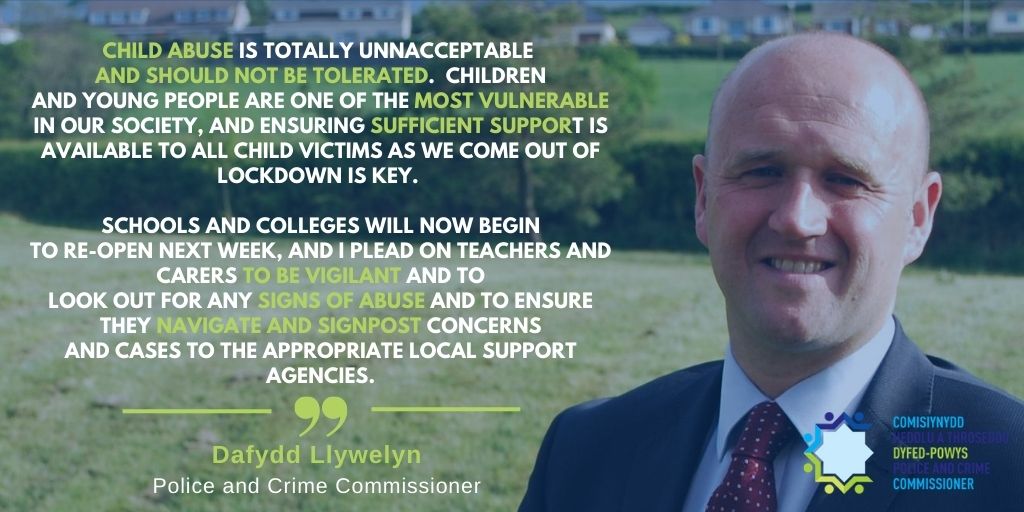28 Aug 2020
Dyfed-Powys Police and Crime Commissioner, Dafydd Llywelyn has come out in support of calls by NSPCC charity for government investment in recovery planning that will provide local multiagency partnerships with the resources to identify and respond to the risks children and young people have experienced in lockdown.
NSPCC last week published their annual ‘How safe are our children?’ report for 2020, a comprehensive examination of the safety of adolescents across the UK, which also includes a section on the impact of coronavirus on children’s safety.
During the coronavirus lockdown, reports of physical abuse to the NSPCC rose by 53%.
Its helpline received 1,066 contacts about physical abuse on average each month between April and July, compared with a monthly average of 696 before lockdown.
One of the key policy calls the NSPCC have identified in response to the report findings is the need for investment to respond to the risks children and young people have experiences in lockdown.
Police and Crime Commissioner Dafydd Llywelyn, has worked passionately during his time in Office to safeguard the vulnerable and to ensure that the voices of young people are heard. The Commissioner is also a Trustee of Embrace Child Victims of Crime Charity.
PCC Dafydd Llywelyn said, “Child abuse is totally unacceptable and should not be tolerated. Children and young people are one of the most vulnerable in our society, and ensuring sufficient support is available to all child victims as we come out of lockdown is key.
“Lockdown has been a difficult time for many children and young people, and the findings of this report by the NSPCC is concerning in many ways. The report identifies the need for significant investment in recovery planning to support children who have suffered in recent months, and I am supportive of these calls.
“Schools and Colleges will now begin to re-open next week, and I plead on teachers and carers to be vigilant and to look out for any signs of abuse and to ensure they navigate and signpost concerns and cases to the appropriate local support agencies”.
Peter Wanless, NSPCC chief executive, said: “No-one has been left unaffected by the uncertainty we are living through. For adolescents, already navigating perhaps the most challenging period of their lives, the impact is likely to be significant and, in some cases, lasting.
“As pupils return to education, we need to be prepared to make sure schools and teachers, children’s social care and other safeguarding partners are ready to support every young person who has suffered during lockdown.”
Police and Crime Commissioner Dafydd Llywelyn continued, “Ensuring effective victim support has been a priority of mine as a Commissioner. One of my priorities since being in Office has been to explore options for multi-agency initiatives to prevent and protect young people from exploitation and abuse, with a focus on early intervention initiatives to limit the damage caused by adverse childhood experiences.
“In recent months, along with staff in my office I have worked hard to secure additional funding from the Government for local organisations that provide support for victims of domestic and sexual violence in Dyfed-Powys to assist them with COVID 19 related costs.
“I will now look to support the calls from the NSPCC for government investment in recovery planning, and look forward to discuss further with colleagues from the NSPCC and other agencies and organisations to ensure children and young people are provided with the support they need”.
ENDS
NSPCC Annual ‘How safe are our children?’ report for 2020:
https://learning.nspcc.org.uk/media/2287/how-safe-are-our-children-2020.pdf
More information:
Gruff Ifan
Police and Engagement Advisor
Gruffudd.Ifan.OPCC@dyfed-powys.pnn.police.uk
